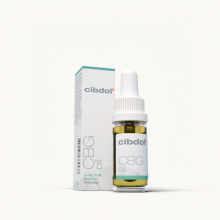Who should not take CBG?
Published:
CBG, short for cannabigerol, is a non-intoxicating compound found in cannabis and hemp gaining attention for its potential therapeutic effects. However, CBG is not suitable for everyone. Certain individuals should exercise caution or avoid CBG altogether depending on factors like age, medical conditions, medications used, and personal risks.
Contents:
This article reviews who should likely avoid CBG supplements based on current evidence and safety concerns.

What is CBG?
First, a quick overview of what CBG is.
CBG stands for cannabigerol - it is the precursor to compounds like CBD and THC in the cannabis plant. CBG interacts with the endocannabinoid system but does not have psychoactive effects.
Early research suggests CBG may offer benefits for conditions like pain, inflammation, bacterial infections, anxiety, and gastrointestinal disorders due to its wide-ranging effects in the body and brain.
However, human studies on CBG are still in their infancy. Its long-term safety profile and drug interactions are not fully characterized yet. This makes it important to identify populations who may be at higher risk from potential adverse effects.
Populations Who Should Avoid CBG
Based on current evidence and cautions, the following groups should likely avoid taking CBG supplements:
Pregnant or Breastfeeding Women
There have been no scientific studies investigating the safety of CBG for pregnant or breastfeeding mothers.
Other cannabinoids like THC and CBD transfer to breastmilk and may impact early development. Until safety is established, CBG is not recommended.
Children and Adolescents
The effects of chronic CBG exposure on the developing brain and endocannabinoid system are unknown.
Children and teenagers should avoid CBG until further research confirms its safety for young users.
Those with Cannabis Allergies
Allergies to cannabis plants are rare but can cause symptoms like skin rash, runny nose, and throat tightening. If you have reacted to cannabis, avoid CBG as cross-reactivity is likely.
People Prone to Psychosis
High doses of THC-containing cannabis have been linked to psychotic episodes in those vulnerable to schizophrenia and bipolar disorder.
While pure CBG should not have major psychotropic effects based on research so far, caution is still advised for those with psychosis risks.
Individuals Taking Certain Medications
CBG may interact with drugs metabolized by the CYP450 liver enzymes, as well as medications with sedating effects.
Those on blood thinners, benzodiazepines, immunosuppressants, heart medications, and more should first discuss with a doctor.
People with Glaucoma
While CBD may lower eye pressure, early evidence suggests THC and potentially CBG could increase ocular pressure which is harmful for glaucoma patients. CBG is not recommended for those with this eye disease.
Individuals with Liver Disease
The liver metabolizes CBG. Those with impaired liver function like cirrhosis or hepatitis may experience greater side effects due to buildup of CBG in the body.
People with Parkinson’s Disease
Levodopa is a common Parkinson's medication. A small study found CBD may increase levodopa levels and worsen motor side effects. Although unconfirmed with CBG, caution is prudent.
So in summary, pregnant/nursing women, children, those with allergies or certain medical conditions, and people on specific medications should likely avoid CBG until more research establishes its safety profile. Consulting a doctor is advised.
People Who Should Use CBG With Caution
Beyond those who should avoid CBG entirely, there are some populations who may be able to use CBG cautiously but require extra monitoring and guidance:
Older Adults
Research on CBG in the elderly is limited. Older users may require lower doses due to decreased metabolism and liver function. Starting with very low doses under medical supervision is prudent.
Individuals on Medications
Anyone taking prescription drugs should first consult their doctor or pharmacist about potential CBG interactions. This includes herbs and over the counter medications too. Careful monitoring is required.
People with Anxiety Disorders
CBG shows promise for reducing anxiety. However, high THC-containing cannabis has also been linked to worsening anxiety. If using CBG for anxiety, extra care is warranted in case symptoms are exacerbated.
Those with Blood Disorders
Both CBD and CBG may impact blood clotting through effects on platelets. Those with bleeding disorders or using anticoagulant medications should use CBG cautiously under supervision.
People with Sensitivities to Cannabis
Some individuals experience headaches, nausea, dizziness or grogginess from even small amounts of cannabis compounds. Starting with extremely low CBG doses and ramping up very slowly while monitoring side effects is key.
In summary, while these populations may be able to use CBG safely with proper precautions, careful oversight by a medical professional is strongly advised.
General Precautions for Using CBG Safely
For anyone choosing to try CBG, some general usage precautions include:
- Talking to your doctor about a safe dosage range and potential drug interactions
- Doing a skin patch test for allergic reaction before using new CBG products
- Starting with very low doses like 2-3 mg and slowly increasing over weeks
- Using products only from reputable brands with independent lab testing
- Carefully tracking any side effects and discontinuing CBG if adverse reactions occur
- Avoiding combing CBG with alcohol, sedatives, or other substances
- Not driving or operating heavy machinery after taking high doses of CBG until effects are known
- Staying well hydrated and eating something when dosing to improve absorption and reduce side effects
Exercising caution is key with novel supplements like CBG where research on safety and long-term effects in humans is limited. Consulting a doctor regularly can help identify potential risks specific to your personal health status and regimen.
Fact Section
Here are some important facts about CBG safety and populations who should use caution or avoid CBG:
- CBG is a non-intoxicating cannabis compound with emerging research showing therapeutic potential.
- However, human studies on CBG are very limited overall, with long-term safety and drug interactions not fully characterized yet.
- Pregnant women, children under 18, and those with cannabis allergies should avoid CBG until more data confirms its safety.
- Individuals prone to psychosis, with certain medical conditions, or taking medications that could interact should likely also refrain from CBG presently.
- Older adults, people with anxiety, blood disorders, liver disease, Parkinson's and sensitivities may be able to use CBG with extra precautions and monitoring.
- Starting with very low doses, ramping up gradually, tracking side effects closely and discussing with one's doctor is key to minimizing risks.
- Choosing reputable brands with independent testing and following general safety precautions are also advised for any CBG use.
- Further research characterizing CBG's safety across different populations and conditions is still needed.
Who should not take CBG? Conclusion
In summary, the non-intoxicating cannabis compound CBG shows promise for treating a range of health conditions, but human research is still in early stages. Its safety profile, especially long-term risks with chronic usage, requires more investigation. Certain populations like pregnant women, minors, and people with allergies or medical conditions may face increased risks from CBG that outweigh potential benefits currently. Those able to use CBG should do so cautiously under medical supervision, starting with low doses and incrementing slowly while tracking side effects. Choosing well-tested brands and avoiding drug interactions is also key to minimizing adverse reactions. Until large-scale studies establish CBG's safety across diverse groups, populations at risk for side effects should refrain from usage. With careful medical guidance, CBG may ultimately prove beneficial for many if proper precautions are taken - but avoiding CBG remains most prudent for certain individuals at this time given limited human safety research presently.
Resources used to write this article
For an overview of CBG and its potential effects:
- Morales, P., Hurst, D. P., & Reggio, P. H. (2017). Molecular Targets of the Phytocannabinoids: A Complex Picture. Progress in the chemistry of organic natural products, 103, 103–131. https://doi.org/10.1007/978-3-319-45541-9_4
- Natural Medicine Journal. (2018). Cannabigerol: A Major Non-Psychotropic Cannabis Compound with Potential Therapeutic Utility. https://www.naturalmedicinejournal.com/journal/2018-09/cannabigerol-major-non-psychotropic-cannabis-compound-potential-therapeutic-utility
For risks of CBG during pregnancy/breastfeeding:
- Metz, T.D., Borgelt, L.M. (2018). Marijuana Use in Pregnancy and While Breastfeeding. Obstetrics and Gynecology, 131(5), 898-901. https://doi.org/10.1097/AOG.0000000000002586
- Jaques, S.C., Kingsbury, A., Henshcke, P., Chomchai, C., Clews, S., Falconer, J., Abdel-Latif, M.E., Feller, J.M., Oei, J.L. (2014). Cannabis, the pregnant woman and her child: weeding out the myths. Journal of Perinatology, 34, 417-424. https://doi.org/10.1038/jp.2013.180
For interactions with medications:
- Brown, J.D. (2017). Potential Adverse Drug Events and Drug–Drug Interactions with Medical and Consumer Cannabidiol (CBD) Use. Journal of Clinical Medicine, 6(7), 89. https://doi.org/10.3390/jcm7070089
- Grayson, L., Vines, B., Nichol, K., Szaflarski, J.P. (2018). An interaction between warfarin and cannabidiol, a case report. Epilepsy & Behavior Case Reports, 9, 10-11. https://doi.org/10.1016/j.ebcr.2017.10.001










